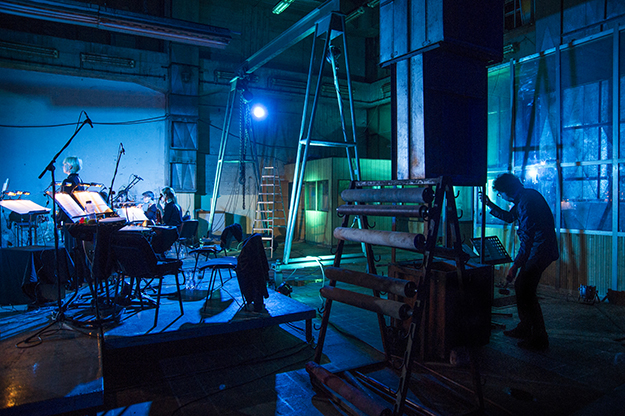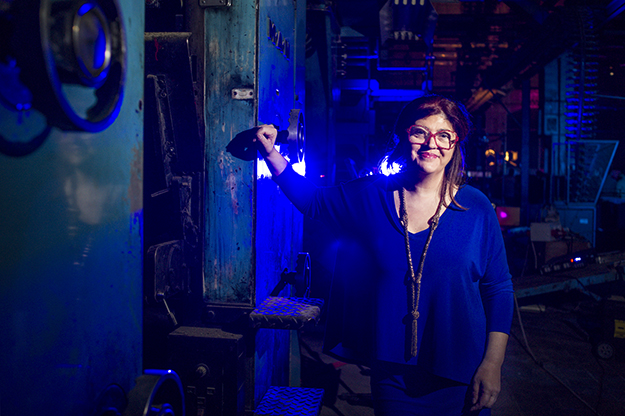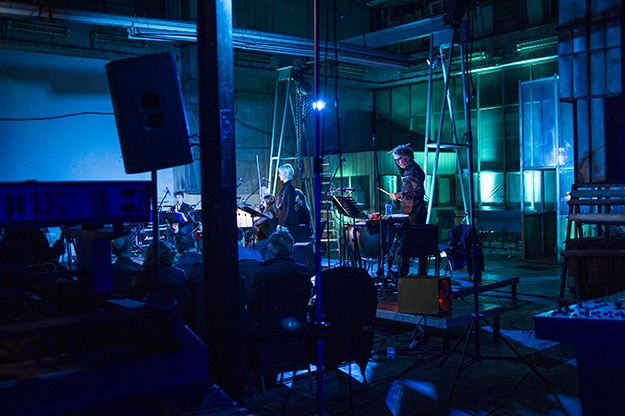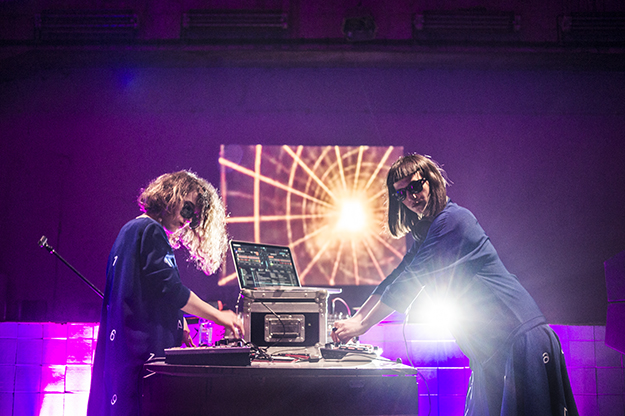A long dark hallway with a cracked concrete floor greets you upon entrance to Prishtina’s Rilindja Printing House. Inside, ominous and gargantuan old printing machinery, a relic of a long since passed technological era, stand tall at the entrance to pitch black toilets, where water constantly drips from the ceiling and cracked pipes. On the opposite wall is a door to a huge hall. Just as gothic as the rest of the building, the cavernous space has no windows.
On Friday night (March 31) the warehouse was dimly lit, and created a psychological setting that chimed in perfect harmony with a performance of “The Dark,” an opera by Luxembourg composer Albena Petrovic-Vratchanska.

Experimental opera “The Dark” utilizes unusual locations and non-traditional instruments. Photo: Atdhe Mulla / K2.0.
Before the show, chairs lined up in the hall began to fill, as the Prishtina public waited in eager anticipation for a different kind of classical opera. After the introduction, the troupe took their places, and in the half dark hall filled with the scents of rust, damp and old production machinery, peculiar and complex sounds arose from the Luxembourg ensemble for contemporary music “United Instruments of LUCILIN,” before the unpredictable vocals of French musician and soprano, Donatienne Michel-Dansac swirled over the top.
Michele-Dansac was telling an Ancient Greek tragedy through song, a love story between the great lyre player Orpheus and the beautiful Eurydice. The narrative’s language shifted between Bulgarian, English, French, and even Latin. Bulgarian born composer Petrovic-Vratchanska describes the opera as very romantic. “It is the greatest love story from greek mythology,” she told K2.0.
When Petrovic-Vratchanska moved to Luxembourg to study, she found a strong mentor in Claude Lenners, a contemporary classical composer from Luxembourg, who has greatly influenced her music style.
“From this moment, and now for 20 years already, I have composed in this style. I’m always searching for new sounds,” she said. “Even when I work on a small piece for piano, even then I’m searching for new sounds, by putting new instruments inside. When you listen, you do not know what exactly is playing.”

Albena Petrovic-Vratnachska finds her inspiration in both Ancient Greece and contemporary Luxembourg. Photo: Atdhe Mulla / K2.0.
Petrovic-Vratchanska has written more than 600 works in various music genres, but this is her first opera. “We don’t have a stage, or movements, it is static,” she explained. “But through the music, and with the instruments I try to explain all the psychological developments.”
At Rilindja on Friday, sounds emanated from all over, and the most peculiar objects became musical instruments. “Some percussion instruments were coming from the kitchen” said Petrovic-Vratchanska, laughing. She has often said that what she does is new, that she does not copy anyone and that everything she does is original, drawn from her experiences; from what she has read, or who she has met.
“The Dark” at the DAM
The performance of the opera was a celebration of two of Kosovo’s well established cultural festivals, marking both the closing of the 17th edition of Kosovo’s Francophone week, and the opening of the 12th DAM International Music Festival in Prishtina, which runs until Saturday (April 8).

“The Dark” received mixed reviews from the Prishtina audience, from confusion to delight. Photo: Atdhe Mulla / K2.0.
Lejla Pula-Haxhiu, the artistic director of Chopin Piano Fest Prishtina, and a piano player herself, believes that the opera provided a novelty for the Prishtina public. “It was named ‘The Dark’ and truly it gave you the impression of darkness,” she told K2.0 after the show.
Pula-Haxhiu was thankful towards the whole ensemble, the composer, and the DAM Festival for presenting it to the Prishtina public, whom she believes have a strong appetite for attending classical performances, especially when given the opportunity to dive into this “incredibly interesting work.”


